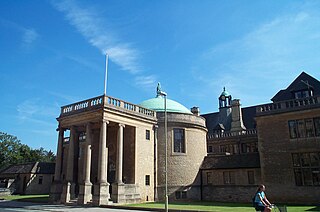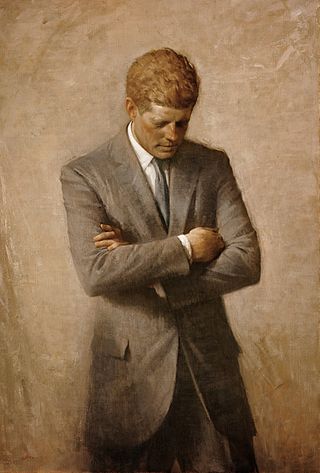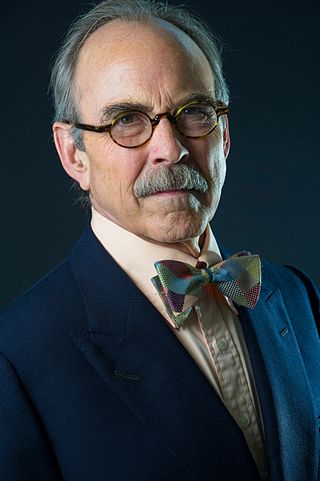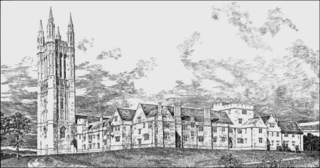
The Royal Aeronautical Society, also known as the RAeS, is a British multi-disciplinary professional institution dedicated to the global aerospace community. Founded in 1866, it is the oldest aeronautical society in the world. Members, Fellows, and Companions of the society can use the post-nominal letters MRAeS, FRAeS, or CRAeS, respectively.
The Harkness Fellowship is a program run by the Commonwealth Fund of New York City. This fellowship was established to reciprocate the Rhodes Scholarships and enable Fellows from several countries to spend time studying in the United States.

The Marshall Scholarship is a postgraduate scholarship for "intellectually distinguished young Americans [and] their country's future leaders" to study at any university in the United Kingdom. It is considered among the most prestigious scholarships for U.S. citizens, and along with the Fulbright Scholarship, it is the only broadly available scholarship available to Americans to study at any university in the United Kingdom.
The Commonwealth Scholarship and Fellowship Plan (CSFP) is an international programme under which Commonwealth governments offer scholarships and fellowships to citizens of other Commonwealth countries.

The British School at Rome (BSR) is a British interdisciplinary research centre supporting the arts, humanities and architecture established in Rome. Historical and archaeological study are at the core of its activities.
The English-Speaking Union (ESU) is an international educational membership organisation headquartered in London, England. Founded by the journalist Sir Evelyn Wrench in 1918, it aims to bring together and empower people of different languages and cultures, by building skills and confidence in communication, such that individuals realise their potential. With 35 branches in the United Kingdom and over 50 international ESUs in countries around the world, the ESU carries out a variety of activities such as debating, public speaking and student exchange programmes, runs conferences and seminars, and offers scholarships, to encourage the effective use of the English language around the globe.

Roger Mellor Makins, 1st Baron Sherfield, GCB GCMG FRS DL, was a British diplomat who served as British Ambassador to the United States from 1953 to 1956.
The Albert Medal of the Royal Society of Arts (RSA) was instituted in 1864 as a memorial to Prince Albert, who had been President of the Society for 18 years. It was first awarded in 1864 for "distinguished merit in promoting Arts, Manufactures and Commerce". In presenting the Medal, the Society now looks to acknowledge individuals, organizations and groups that lead progress and create positive change within contemporary society in areas that are linked closely to the Society's broad agenda.

Edgar John Hughes is a retired British diplomat and former British Ambassador to Venezuela, Argentina and Paraguay.
Christopher James Makins, 2nd Baron Sherfield was an Anglo-American diplomat, foreign policy expert, and author.

Rhodes House is a building part of the University of Oxford in England. It is located on South Parks Road in central Oxford, and was built in memory of Cecil Rhodes, an alumnus of the university and a major benefactor. It is listed Grade II* on the National Heritage List for England.

Kennedy Scholarships provide full funding for up to ten British post-graduate students to study at either Harvard University or the Massachusetts Institute of Technology (MIT). Susan Hockfield, the sixteenth president of MIT, described the scholarship program as a way to "offer exceptional students unique opportunities to broaden their intellectual and personal horizons, in ways that are more important than ever in an era defined by global interaction.". In 2007, 163 applications were received, of which 10 were ultimately selected, for an acceptance rate of 6.1%.

William Hall "Bill" Janeway is an American venture capitalist and economist. His work on the innovation economy emphasizes the strategic role played by the state and by financial speculators.
The Honours Committee is a committee within the Cabinet Office of the Government of the United Kingdom formed to review nominations for national honours for merit, exceptional achievement or service. Twice yearly the Honours Committee submits formal recommendations for the British monarch's New Years and Birthday Honours. Members of the Honours Committee—which comprises a main committee and nine subcommittees in speciality areas—research and vet nominations for national awards, including knighthoods and the Order of the British Empire.
As part of the British honours system, Special Honours are issued at the Monarch's pleasure at any given time. The Special Honours refer to the awards made within royal prerogative, operational honours and other honours awarded outside the New Years Honours and Birthday Honours.
Aradhna Tripati is an American geoscientist, climate scientist, and advocate for diversity. She is a professor at the University of California, Los Angeles (UCLA) where she is part of the Institute of the Environment and Sustainability, the Department of Earth, Planetary, and Space Sciences, the Department of Atmospheric and Oceanic Sciences, and the California Nanosystems Institute. She is also the director of the Center for Diverse Leadership in Science. Her research includes advancing new chemical tracers for the study of environmental processes and studying the history of climate change and Earth systems. She is recognized for her research on climate change and clumped isotope geochemistry. She studies the evolution of atmospheric carbon dioxide levels and the impacts on temperature, the water cycle, glaciers and ice sheets, and ocean acidity.

Jane Eliza Procter Fellowships are scholarships supporting academic research at Princeton University. The Fellowships were endowed by William Cooper Procter in 1921–22, and named after his wife, Jane Eliza Johnston Procter (1864–1953). The original terms of the Fellowships were for three awards, "each with an annual stipend of two thousand dollars, upon which each year two British and one French scholar will have the privilege of residence in the Princeton Graduate College, and of pursuing advanced study and investigation". The Fellowships were to be appointed annually on the recommendation of the University of Oxford, the University of Cambridge, and the École Normale Supérieure.

Ambika Bumb is an American biomedical scientist and businessperson. Bumb is a nanomedicine specialist who uses nanotechnology for the detection and treatment of disease. As a postdoctoral researcher at the National Cancer Institute and the National Heart, Lung, and Blood Institute, Bumb made new discoveries with nanodiamonds which led to the launch of the biotech Bikanta. Bumb is currently the Deputy Executive Director at the Bipartisan Commission on Biodefense.
Maurice Rossie Ewing, CBE, FRCSEd, FRCS, FRACS was a Scottish surgeon who was the first professor of surgery at the University of Melbourne, Australia. His department established an early programme of renal transplantation in Australia.
As part of the British honours system, Special Honours are issued at the Monarch's pleasure at any given time. The Special Honours refer to the awards made within royal prerogative, operational honours, political honours and other honours awarded outside the New Years Honours and Birthday Honours.










